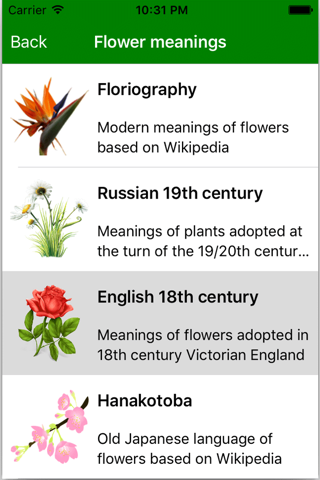
Do you speek the language of flowers?
Find out the different meanings of various flowers with our application!
The language of flowers was known since ancient times. Legends about the origin of flowers and plants were known thousands of years: in ancient Greece, in ancient China, Russia and India. In the calendar, many people still have festivals associated with the plants. Spruce, mimosa, cloves, bay - these plants have values known to all.
The language of flowers, like our language, changes with time. Flowers have their special meanings in different times and territories. This application display the most known meanings of flowers, adopted in Russia, England and Japan in different ages.
In Europe, the language of flowers became known thanks to Lady Mary Wortley Montagu - English writer and traveler. Lady Mary is known for scientifically valuable work "Letters from the Turkish Embassy" the first work of secular women of Muslim East. As the wife of the British ambassador to the Ottoman Empire, she described the language, adopted in eastern harems, the language of objects and colors, used for a secret correspondence between lovers.
The greatest heyday the language of flowers was at the time of Victorian England, known for its puritanical mores, in the second half of the 19th century.
In Russia, the language of flowers became known thanks to a Russian famous poet and writer Dmitry Petrovich Oznobishin. He published a book of poems "Selam, or the Language of Flowers" in 1830 in Saint-Petersburg. At the end of the book he published about 400 meanings of plants. The book was a great success and the language of flowers was generally accepted until the revolutionary events in Russia in 1917, when interest in it faded away.
Hanakatoba - the Japanese name for the language of flowers. Hana - Japanese symbol of life, color and love. Japanese language of flowers is still alive. It is used when choosing flowers, cards, tattoos, painting utensils. Its symbolism is reflected in contemporary Japanese films and anime. This language is deep into Japanese culture and tradition.
The modern language of flowers is international and ambiguous. There is no consensus about the meaning of a flower there. The language takes its new name - floriography.
I hope applications “Speech of flowers” will help you to make unusual and enjoyable romantic gift, as well as see new nuances in the pictures and novels of the past.



